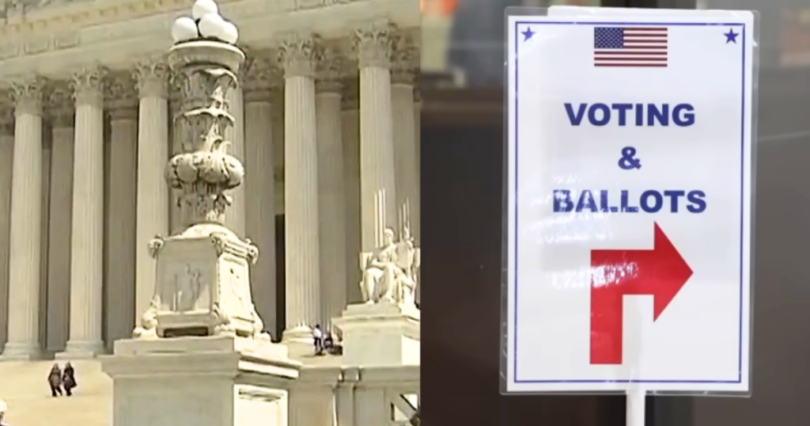New York Court Strikes Down Law Allowing Noncitizens to Vote in Municipal Elections
In a landmark decision, the New York Court of Appeals has struck down a controversial law that would have allowed noncitizens and illegal immigrants to vote in municipal elections.
The court ruled 6-1, declaring the law unconstitutional and reaffirming that only U.S. citizens have the right to vote in New York’s elections, effectively ending a contentious legal battle.
🚨 #BREAKING: New York’s highest court, the Court of Appeals, has BLOCKED New York City’s law allowing non-citizens to vote, 6-1
This, along with Trump’s sealed border and mass deportations, just KlLLED the Democrats’ plans to rig elections by importing illegal voters.
HUGE win… pic.twitter.com/Fae6f2nEdA
— Nick Sortor (@nicksortor) March 20, 2025
The law, passed in 2021 by the New York City Council during the final days of Mayor Bill de Blasio’s administration, was automatically enacted in 2022 after neither de Blasio nor his successor, Mayor Eric Adams, vetoed it. Designed to extend voting rights to over 800,000 noncitizens, including legal immigrants, in municipal elections, the law quickly faced fierce legal opposition, according to Trending Politics.
Critics, including Republican lawmakers, argued that it violated the state constitution, which explicitly limits voting rights to U.S. citizens.
Supporters of the law, including progressive voter advocacy groups, argued that it was a necessary step to ensure that immigrants who contribute to society through taxes and other civic duties should be allowed to participate in local elections. They emphasized that noncitizens, particularly those who are legal immigrants, often play a vital role in the communities where they live, work and raise families.
Supporters believed that the law could help make the voting process more inclusive and better reflect the demographic diversity of New York City.
However, the law faced immediate challenges. Critics, including Republican officials and some legal experts, maintained that it was a violation of the state constitution, which clearly restricts voting rights to U.S. citizens. Joe Borelli, the former Republican minority leader of the New York City Council and a key plaintiff in the lawsuit, called the case “an open-shut issue,” arguing that the constitution’s language could not be interpreted in any other way.
Borelli and other critics warned that allowing noncitizens to vote in elections would undermine the integrity of the voting process.
In its 6-1 ruling, the court sided with the opponents of the law, affirming that the state constitution restricts voting rights to U.S. citizens. Chief Judge Rowan Wilson, writing for the majority, warned that allowing local governments to expand voter eligibility beyond citizens could set a dangerous precedent.
He emphasized that such a broad interpretation could open the door for unqualified groups, such as minors or those lacking citizenship, to demand the right to vote.
“[I]t is plain from the language and restrictions contained in Article II that ‘citizen’ is not meant as a floor, but as a condition of voter eligibility: the franchise extends only to citizens whose right to vote is established by proper proofs and who vote by ballot,” Wilson wrote, according to The Daily Caller.
The ruling has sparked strong reactions from both sides. Republicans, who had long opposed the law, celebrated the decision as a victory for election integrity. Assemblymember Michael Tannousis, a plaintiff in the case, stated, “This decision upholds the sanctity of the voting process and ensures that only U.S. citizens can participate in our elections,” per TP.
Tannousis and other opponents of the law have argued that the focus should be on improving voter participation among U.S. citizens, especially given New York City’s historically low voter turnout rates.
Progressive advocates, however, expressed disappointment and frustration over the ruling. They argued that the decision denied voting rights to noncitizens who contribute to their communities in meaningful ways.
Supporters of the law had hoped it would set a new precedent for expanding voting rights, particularly for legal immigrants who have often been excluded from political processes despite their significant contributions to society.
The ruling is significant not only for New York City but also for other municipalities considering similar noncitizen voting laws. Cities like San Francisco, Washington, D.C. and several cities in Vermont and Maryland have allowed noncitizens to vote in certain elections.
The New York Court of Appeals’ decision is likely to influence future legal challenges and could have a far-reaching impact on how other cities approach noncitizen voting rights.
Scroll down to leave a comment and share your thoughts.


Leave a Comment